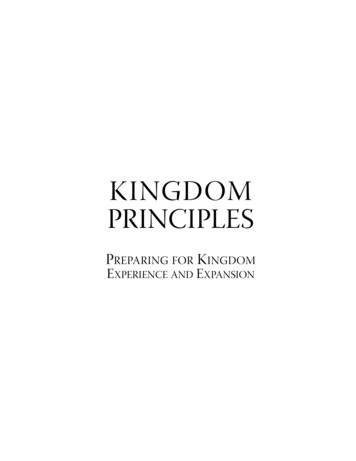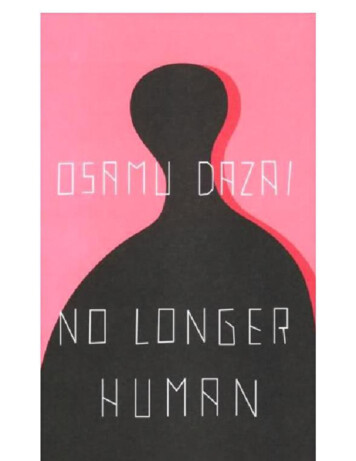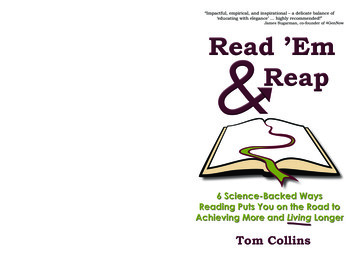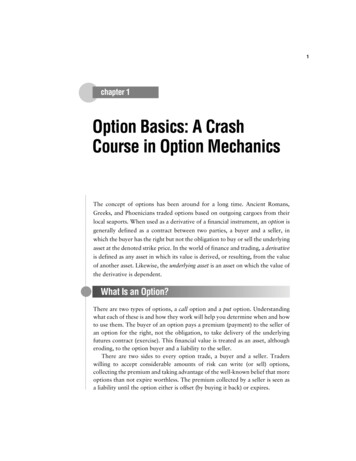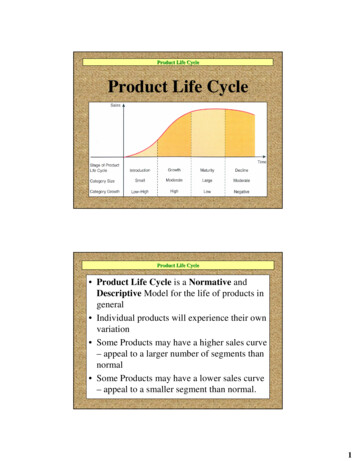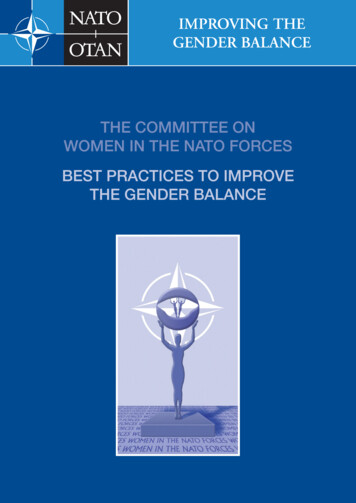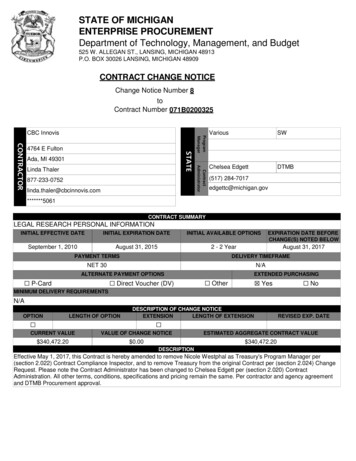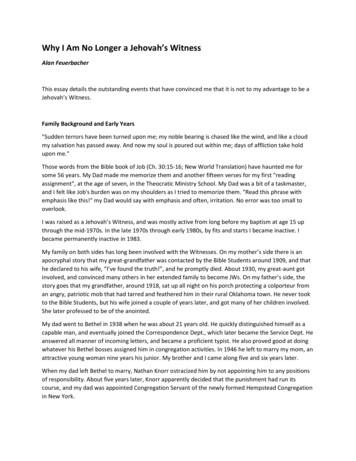
Transcription
Why I Am No Longer a Jehovah’s WitnessAlan FeuerbacherThis essay details the outstanding events that have convinced me that it is not to my advantage to be aJehovah’s Witness.Family Background and Early Years"Sudden terrors have been turned upon me; my noble bearing is chased like the wind, and like a cloudmy salvation has passed away. And now my soul is poured out within me; days of affliction take holdupon me."Those words from the Bible book of Job (Ch. 30:15-16; New World Translation) have haunted me forsome 56 years. My Dad made me memorize them and another fifteen verses for my first "readingassignment", at the age of seven, in the Theocratic Ministry School. My Dad was a bit of a taskmaster,and I felt like Job's burden was on my shoulders as I tried to memorize them. "Read this phrase withemphasis like this!" my Dad would say with emphasis and often, irritation. No error was too small tooverlook.I was raised as a Jehovah’s Witness, and was mostly active from long before my baptism at age 15 upthrough the mid-1970s. In the late 1970s through early 1980s, by fits and starts I became inactive. Ibecame permanently inactive in 1983.My family on both sides has long been involved with the Witnesses. On my mother’s side there is anapocryphal story that my great-grandfather was contacted by the Bible Students around 1909, and thathe declared to his wife, “I’ve found the truth!”, and he promptly died. About 1930, my great-aunt gotinvolved, and convinced many others in her extended family to become JWs. On my father’s side, thestory goes that my grandfather, around 1918, sat up all night on his porch protecting a colporteur froman angry, patriotic mob that had tarred and feathered him in their rural Oklahoma town. He never tookto the Bible Students, but his wife joined a couple of years later, and got many of her children involved.She later professed to be of the anointed.My dad went to Bethel in 1938 when he was about 21 years old. He quickly distinguished himself as acapable man, and eventually joined the Correspondence Dept., which later became the Service Dept. Heanswered all manner of incoming letters, and became a proficient typist. He also proved good at doingwhatever his Bethel bosses assigned him in congregation activities. In 1946 he left to marry my mom, anattractive young woman nine years his junior. My brother and I came along five and six years later.When my dad left Bethel to marry, Nathan Knorr ostracized him by not appointing him to any positionsof responsibility. About five years later, Knorr apparently decided that the punishment had run itscourse, and my dad was appointed Congregation Servant of the newly formed Hempstead Congregationin New York.
During the 1950s, my dad spent a good deal of time at Bethel in Brooklyn, doing pre-convention work.He also did other kinds of work. Sometimes he would bring me or my brother to Bethel, where we mightquietly play among the paper cuttings that dropped down into a pile from trimming magazines on thefloor above. Several years, my dad headed up the Plumbing Department for several of the big 1950sconventions at Yankee Stadium.About late 1958, Knorr came to our house on Long Island and appointed my dad to be the CongregationServant for the troubled Bellmore Congregation. The servants there were basically incompetent, and mydad gradually fixed things to Knorr’s satisfaction. My dad remained in that position until his healthforced him to step down in the early 1960s.After my dad stepped down, due to his health problems our family had severe economic difficulties, andmy mom had to go to work. Our spirituality, as measured by JW activity, also suffered. During part ofthis time I would have been quite happy to quit being a JW altogether. At other times I was happy to bea JW because “we have the Truth!” When I turned 15, I started taking JW teaching more seriously, andin mid-1967 was baptized a couple of months before I turned 16. Looking back, I understand that thiswas mostly due to peer pressure.Problems in the Spiritual ParadiseA couple of months after I got baptized, the Society came out with its ban on organ transplants. Istrongly disagreed with the reasoning set forth as justification, and even discussed it a bit with my dad.He was fully in agreement with the Society, and so I let the matter drop.In 1968 I remember being electrified at the end of a Service Meeting when the Circuit Servant AnthonyConte, following the Kingdom Ministry, said, “Brothers! Do you know where we are in the stream oftime? Do you realize that we’re only 88 months from the end of six thousand years of man’s creation?Do you understand what that means?” Well of course, I knew very well what that meant—1975 wasgoing to bring Armageddon! The Society had not directly said that, but had said it in so many words, andI understood that Brother Conte was emphasizing the date. This abrupt realization spurred me to reachout for more JW activity.In 1968 the Society came out with its six-month Bible study program. The idea was that if a Bible studenthad not progressed to the point of at least coming to meetings after six months of study, he was to bedropped. The reasoning set forth was that JWs are so busy with preaching the good news of theKingdom just before Armageddon that they shouldn’t waste time on unappreciative ones. This did notset well with me, because even at age 16 I understood that people progress at different rates.For the next couple of years, until I graduated high school, I vacation pioneered a number of times. Ifound that I did not like it. After I graduated, I continued doing that, but was unable to maintain a Biblestudy for the continuous six months needed to qualify as a regular pioneer. Within a year I gave up onthe idea of regular pioneering and concentrated on getting a decent job.For some years my parents rented out upstairs rooms to supplement their income. Mostly it was collegestudents who rented. In 1967 they rented a room to a man of about 40, who was recently divorced and
had moved to Long Island. He was quite friendly, and my mom and we boys enjoyed talking to him onoccasion. Eventually my mom began studying the Bible with him.By mid-1968, my parents’ marital troubles culminated with my mother getting involved with thatroomer. The roomer had been coming to meetings for some time, and had struck up a friendship withthe Bible Study Servant. They went out in service together often. In late 1968, my dad discovered mymom’s infidelity and so she was disfellowshipped, the time allotted being specified as a minimum ofthree years. That quickly led to a divorce, which was finalized in mid-1969. The roomer was declared theequivalent of disfellowshipped for at least three years. In mid-1969 my mom married my stepdad. Afterthree unpleasant years passed, and they did all that was required of them, they were reinstated. Mystepdad soon became a much-loved elder.When my parents were divorced, it became evident that my father was far more morally culpable thanmy mother for the situation. Further, he went around gossiping to all their former friends about how"badly" my mother had treated him all during the marriage. There was a bit of truth to that, but it takestwo to tango. My brother and I spoke to the Congregation Servant, but he said that, because my father'sactions were not disfellowshipping offenses, there was nothing he could do. But he also refused tocounsel my father to stop his un-Christian gossiping activities. So my brother and I went in to BrooklynBethel and spoke to the head of the Service Department, Harley Miller, who had been one of my father'sfriends during his days at Bethel. We explained the situation for about two hours. He, too, said therewas nothing to be done. The episode left a sour taste in my mouth about so-called justice in "theChristian congregation."When my mom was disfellowshipped, my grandparents let her live in an upstairs room. By this time, mybrother and I had also moved to my grandparents’ house and slept in a spare bedroom. We drove mybeater of a car two towns over to finish high school, which I did in 1969. Apparently all this commotionspurred my grandparents to retire to Florida, which they did in the autumn of 1969. A few months later,my brother moved in with my dad, who by this time had remarried and moved to Massachusetts.During the Christmas season of 1969-1970 my parents and I drove to Florida to visit my grandparentsand other relatives. Now, since the 1930s, grandma had been an active JW, but grandpa never took to it.But he was pressured by the family to become a JW. After moving to Florida, he began seriously thinkingof doing it. He was very private and never discussed anything at all, much less his religious views, withme. But one day I found on the table by his easy chair a brochure from Herbert Armstrong’s WorldwideChurch of God. I later found out that this church was very close to the JWs in doctrinal outlook. I readthe brochure, and a couple of things it said severely pricked my conscience. It criticized the WatchtowerSociety for the six-month Bible study program, correctly stating that this was an abandonment ofChristian principles. It said that the effect was to produce “assembly line Christians”, meaning JWs whohad only a surface understanding of the Bible but whose beliefs and faith would not stand up underpressure. It said that the Watchtower Society, rather than producing witnesses for Jehovah, wasproducing “Watchtower Witnesses”. I realized that all this was true, and it really pricked my conscience.During the next couple of years, I tried immersing myself in congregational activities. I was asked toconduct the third Theocratic Ministry School, and to conduct the Watchtower Study, and even gave a
couple of instruction talks on the Service Meeting. This did not work out so well, though, because I amnot a fluent speaker.In March 1971 the Society published a Watchtower article which said that the human heart—thephysical organ—was literally the seat of emotion. It held "conversations" with the brain, which wasequated with the mind. Upon reading the article I became agitated, thinking this was among the moststupid things I had ever read. I thereupon decided that the Watchtower Society could not be trusted. Iremember being out in service one day with my best friend, "placing magazines." He tried to explain toone woman about the article, and she reacted like he had two heads. I just wanted to melt into thesidewalk. I argued with my father about the article. He thought it was great and cleared up a lot ofthings. To top it off, the summer district assembly program included a demonstration where a giantgreen brain on one side of the stage lighted up and talked to a giant red heart on the other side. Thedialog reflected the emotional side of a person arguing with the intellectual side. Within a very fewyears, the Society dropped this nonsense.By about mid-1971, many things came together such that I wanted OUT. I had no idea what I wanted todo or where I wanted to go; I just wanted OUT. So I wrote down some silly plans to buy a motorcycleand tour the U.S., camping out along the way. My mom, still disfellowshipped, discovered the plans andconfronted me. After much upset, I told her that I no longer wanted to be a JW. She and my stepdadtold me that if I did not attend JW meetings, I could not live in their house. Realizing that I had receivedno job training as a young JW, and knowing that the pittance I made working at my current job wouldnot pay for the smallest Long Island apartment, I was forced to submit to their wishes. As part of thedeal, I had to begin a Bible study from square one with a young man a few years older than me.So I studied the old Truth book all over again, and another one I can’t remember. During the study, Icarefully thought about the JW ransom sacrifice doctrine. It simply made no sense to me. How couldkilling the reconstituted Jesus possibly atone for the sin of Adam? If God could decide that that killingJesus was sufficient, then why not just forgive and forget? If Johnny does something bad, does it makesense for a father to punish Bobby if Bobby says, “Dad, beat me instead of Johnny!” The young man whostudied with me had no answers, and so I decided to just shelve the problem and move on. This was abig mistake. But I was trapped by economics and my own timidity in not doing what I knew was right.In mid-1972 I began thinking harder about the Society’s teaching that Armageddon would likely hit by1975. I wanted to find the precise basis of the Society’s reasoning. After reading all relevant Societypublications, I realized that there was big hole in the reasoning. I understood all the details—Adam wascreated in 4026 BCE, move forward 6,000 years (accounting for no “zero year”) and we get to 1975. Theproblem was: why pick 6,000 years as the amount of time to move forward? Why not 5,999 or 6,001?Why not 4,000 or 10,000? I again read everything in Society publications I could get my hands on, foundno answers, and concluded that picking the round number 6,000 amounted to just an assumption thatthe round number had any more significance than any other number. So I wrote a letter to the Societyexplaining all this, and asking for their comment. They wrote back and said that 6,000 years was indeedan assumption, but a good one, but they did not explain why. So I dropped the matter, but it never leftmy mind. I wish I had kept the letters. Over the next three years, as 1975 approached, I expected thatthe Society would act responsibly on their admission that 1975 was only an assumption based onspeculation, but of course that never happened. When 1975 passed without incident, I understood onsome level that the men who are in control of the Society are not especially interested in the truth.
Since then, I've learned that the 6,000 year idea can be traced back to antiquity. It appears in thewritings of the early "church fathers", 2nd century BCE rabbinical writings, and Plato. Traces can even befound in 11th century BCE Zoroastrianism. Even Charles Taze Russell admitted that the idea was a"venerable tradition," but he held to it nonetheless.During this time, while I was in my early 20s, like all normal young men, I very much wanted to getmarried, because that was the only way I could “legally” have sex. I was not able to find an appropriatepartner until 1974. At that time, my stepdad got another job, and had to move to another town. Since Iwas doing well in the truth, he invited me to live with him and my mom, since there was plenty of spacein their new place. We began attending the Manhasset Congregation and quickly became friendly withmany people. Almost immediately, I met a young lady. We quickly became friendly and within about sixmonths were engaged. We got married in June, 1975. For several years I had worked as a bank teller.The job did not pay well, and had no interesting prospects for the future so far as I was concerned.In August, 1975, I attended a District Convention at the Aqueduct Racetrack in New York City. NathanKnorr gave the concluding talk on Sunday. He spoke about the fact that 1975 had not brought anyevents that the Society had convinced most JWs to expect. He said not to lose hope, that Jehovah can doan amazing number of things in a short time, and after all, there were still more than four months to goin 1975. Of course, nothing happened.Not long after getting married, I was appointed a ministerial servant, and assigned to handle theaccounts. That fit well with my bank experience. I was not consulted about the appointmentbeforehand; the Presiding Overseer (one of the old school, a former Congregation Servant, CompanyServant and personal friend of GB member Theodore Jaracz) simply announced after a Service Meetingthat I had been appointed. I was rather irritated, but kept my mouth shut.Over the next several years I became increasingly uncomfortable with the failure of the 1975expectation. Unbidden, visions kept popping up in my mind about what life would be like in thirty years,when Armageddon still had not come. Looking back, I really had no faith left in the Society.During this time an incident occurred that was to have a major negative impact on my confidence inWatchtower teaching. A friend in the congregation, a young man a bit younger than me, had supportedhimself by mowing lawns while pioneering. After he got married, he gradually worked that into alandscaping business, and began hiring young men. He was naïve about business requirements andfailed to do all the necessary tax work for the people he hired. At one point, a much older man, a JWelder, found out about the tax slip. Apparently there had been bad blood between the families for a longtime, so this elder attempted to have my friend disfellowshipped for breaking Caesar’s law. The body ofelders, which included my stepdad, should have ended the matter then and there, because according toWatchtower Society policy, whether someone fulfills all of Caesar’s requirements is not the elders’business. But the elders deliberated time after time for six months, acting like the Keystone Kops. At onepoint they decided to disfellowship, then rescinded that, then went for private reproof. I found outabout all this when the matter was about 2/3 finished. Finally the Society was called in, which called inyet another elder body, which decided that the matter never should have been brought up to beginwith, since it is not the congregation's business whether someone handles their taxes properly.
I asked my stepdad about what was going on, and he sheepishly told me. That got me thinking seriouslyabout whether elders really are appointed and directed by holy spirit, as the Society had always taught.If these elders really had the holy spirit’s backing when making their decisions, then why the KeystoneKops behavior? So I asked my stepdad and several other elders to explain all this. They were unable toexplain anything to my satisfaction, so I wrote the Society about all this, and so it was arranged that theCircuit Overseer, one Wesley Benner, would explain things to me. We spoke for an hour at my parents’home, and he certainly cleared things up for me. Benner explained that when the Society said thatelders are appointed and directed by holy spirit, that was only a matter of speaking. As long as the menwho actually appoint them go strictly by the Bible’s standards for appointing elders, then because theBible is inspired by holy spirit, it can be said that, in effect, holy spirit has appointed or directed theelder.That did not set well, because that is not the impression one gets from reading Watchtowerpublications. Rather, the clear implication is that God himself directly appoints elders, and even directlyguides them to correct decisions. So I asked Benner if I could summarize the Society’s teaching, and saidthat he should tell me whether I understood. I asked him point blank: "In one sentence, is it or is it nottrue that elders are *directly* appointed by holy spirit?" He hesitated, hung his head, and answered,"No."Naturally, this further damaged my confidence in the Watchtower Society, since they were technicallytelling the truth that elders are not appointed by holy spirit, but using slick, deceptive language to implyan out-and-out falsehood that they knew the rank and file would blindly accept. The goal, of course, wasto reinforce the Watchtower Society’s authority in the community of Jehovah’s Witnesses.The fact that the Society is deceptive in this matter was proved to me unassailably some years later.After I became permanently inactive, I had a conversation with my stepdad about my irritation that theSociety was still teaching this deceptive thing, as shown by a recent Watchtower article. I showed himthe exact language that Benner had used years earlier to explain to me why elders are not actuallyappointed by holy spirit, but my stepdad was so immersed in Watchtower-think that he simply wouldnot see it.CollegeAfter my conversation with Benner, I had little enthusiasm for JW activities, and I went in service as littleas I could get away with. I continued having visions of a black future, with no relief in sight. Then in thespring of 1978, I visited my in-laws. My father-in-law had never been a JW, and I laid out my concernsfor my future before him. Being a research chemist at Kodak, he said that I should seriously considercollege.I told him that I didn’t see how that was practical, given that I had been out of high school nine years bythen, and had no money to speak of. Besides, my wife, as an apparently strong JW, probably wouldn’tgo for it. He said that on our trip home I should breach the subject and see what she said. He knew hisdaughter better than I did, and she was willing to help me go the college route for four years.Apparently she was used to the nice creature comforts her dad had provided, and she made it clear to
me that she’d be happy to help get them again. So we immediately made plans for me to go to a localcommunity college and see how it worked.So in the fall of 1978 I began taking science and engineering courses at Nassau Community College onLong Island. Due to the heavy class schedule and the fact that I continued to work 30 hours a week parttime, I had little time for JW activities and became inactive. My wife was unhappy about that, but weboth figured that was temporary. I did well enough in school that several teachers suggested I transferto a better school as soon as possible. So I put in applications at half a dozen good engineering schools,and to my astonishment was accepted at MIT (Massachusetts Institute of Technology in Cambridge). Inthe summer of 1979 we moved to Cambridge, Massachusetts, where my wife got a secretarial job atMIT. I began attending classes that autumn, taking courses that led to an electrical engineering degree.Almost immediately upon arriving in Cambridge, after getting my living arrangements settled and beforestarting classes, I began trying to contact any professors who might shed light on a question that wasburning in my mind: What was the view of real scientists about the thousands of quick-frozen carcassesof mammoths and other ancient and mostly extinct large animals so often found in the Arctic? Iassumed that such an archeological problem would be of great interest to them. But I quickly found thatthey had no idea what I was talking about.Why was I interested in the question of “quick-frozen mammoths in the Arctic” and such? Because I hadbeen taught by the Watchtower Society, as long as I could remember, that this was definite proof of thehistoricity of Noah’s Flood. As far back as the 1940s the Society was teaching that “quick-frozenmammoths” and such must have been the products of freezing winds that accompanied Noah’s Flood. Itsounded so reasonable to a naïve young man with a scientific bent.When I found that real scientists had no idea about what the Watchtower Society had long beenclaiming as irrefutable proof of Noah’s Flood, I suspected that something was very wrong. It took mesome time to figure out exactly what that was. On the question of why there were “thousands of quickfrozen mammoths in the Arctic,” I found that the entire notion was wrong. While plenty of bones andtusks and other remains have been found, there have been only a handful of documented frozenmammoth carcasses found in the last couple of hundred years. Most were not “quick-frozen” but wereeither completely decayed or decayed to the point of emitting an extreme stench―including andespecially the famous “Berezovka mammoth” found in 1899 and now on display in the LeningradMuseum. To this day the Society cites this mammoth as proof of Noah’s Flood.The Society has often said that a college education is unnecessary and dangerous. It speaksdisparagingly of any young JW who decides to go to college rather than pioneer. During my first year atMIT in 1979/80, I got to feeling pretty bad about what was being said in The Watchtower about collegegoers, and on a number of occasions I complained to my parents about it. On one occasion, my wife andI visited my parents on Long Island, and it so happened that Governing Body member Albert Schroederwas visiting them for the weekend. Since I was feeling resentful about the Society’s comments on goingto college, my parents suggested that Schroeder and I have a talk. He was very friendly, and we had anice conversation. To my surprise, he told me that I shouldn’t pay too much attention to what theSociety said in print about college, and that if it was right for me, I should be satisfied. This placated mefor some time.
In my second semester at MIT I took an anthropology course for which a term paper was required. Idecided to combine my interest in Noah’s Flood with this requirement by writing a paper showing thatNoah’s Flood was a real historical event. I planned to concentrate on Flood legends but also considerphysical effects. Watchtower publications dealing with the Flood contained many references to secularpublications, and I figured that the MIT library would have most of that material on hand. It did, but Iwas hardly prepared for what I found―many of the references in Watchtower literature were fromworthless popular accounts (although the impression was given that these were of real scientific value),or were quoted out of context, or were otherwise a misrepresentation. Some references were handledin such a way that the reader was led to believe they said the opposite of what they actually did.For example, in a number of publications the Society claimed that mammoths had often been found“quick-frozen” in the Arctic in virtually perfect condition. A picture of the famous 1899 discovery of theSiberian Berezovka mammoth, the remains of which are now on display in a Leningrad museum, wassometimes set forth in support of this claim (cf. Creation, p. 203). The picture is taken from theSmithsonian Institution Annual Report for 1903, which contains an extensive report on the recovery ofthe mammoth’s remains. But a perusal of this report shows that, far from being “quick-frozen”, themammoth was largely rotten by the time it froze solid, so that only the outermost parts, such as theshoulder and neck and head, were frozen in an unrotten condition. But even these were so foul thatonly the sled dogs would touch the meat. This report, then, completely contradicted what the Societyhad claimed for decades about such finds in the Arctic. Other references cited by Watchtower writerswere often of the quality of today’s Weekly World News.Because the majority of references in the Watchtower literature I looked at were misrepresented insome way, I could not honestly use them in my paper. I gave up on the Flood theme and thought thatwriting a defense of creation against evolution would work well, so I looked up references on that topicin Society publications. I used the books Did Man Get Here By Evolution or by Creation, Is the BibleReally the Word of God?, and various Watchtower and Awake! articles. But I found the same problemwith these references―ones that were supposed to knock down evolution―as I had found with thoseused to support the Flood. Since the end of the school term was rapidly approaching, I nearly panicked,but managed to find a book written by a lawyer (Darwin Retried, Norman MacBeth), which usedquotations from various scientists to criticize evolution, but without distorting them. This was barelyadequate to let me write the paper in a way I found to be scholastically honest and pass the course. Thisexperience further eroded my opinion of Watchtower scholarship and scholastic integrity.When a person who had been taught from childhood to respect an authority discovers that thatauthority is dishonest, he loses all respect for it, and there is no turning back. The instances ofdishonesty cannot be overturned, and only a complete turnaround on the part of the offendingauthority can begin to restore that person’s confidence in the authority. Of course, such a turnaround isan explicit admission that the authority has been dishonest. When that authority claims to speak forGod, one is forced to understand that the authority cannot have been speaking for God. In plainlanguage: by their dishonesty, Watchtower leaders have proved that they do not speak for God.Watchtower writers have been at the forefront of this dishonesty.During all these years, I kept finding information from a wide variety of sources that suggested that myreligion was not what it claimed to be, and in particular that my religious organization was not telling
people the truth about many things related to science. In the manner of so many people who don't wantto face unpleasant facts, I kept telling myself that, after college was done, I could attack and solve all thethings that were giving me trouble with my faith. Little did I know how severe those things would proveto be.Once I realized that Watchtower writers had consistently deceived me for decades, I was motivated tofind out whether there was such a thing as Noah’s Flood. I gradually found that Noah’s Flood is a myth.Due to the press of coursework at MIT, I had to put this off until I graduated.The Early Oregon YearsUpon graduating from MIT in the spring of 1982, I landed a job at a high-tech engineering companycalled Tektronix, in Beaverton, Oregon, and we moved there in July. I thoroughly enjoyed my work andworked quite a bit of overtime. My wife and I immediately immersed ourselves in congregation activity,JW-related and social. I began going in service again (I still hated it), and joined the Theocratic MinistrySchool. I had promised my wife during college that I would give the Witnesses another try, and I did mybest to put away my misgivings. But it was not to last.In October, 1982 the Society published an Awake! article that argued that the design of plants andanimals s
I was raised as a Jehovah’s Witness, and was mostly active from long before my baptism at age 15 up through the mid-1970s. In the late 1970s through early 1980s, by fits and starts I became inactive. I became permanently inactive in 1983. My family on both sides has long been inv

![[Page 1 – front cover] [Show cover CLEAN GET- AWAY 978-1 .](/img/13/9781984892973-6648.jpg)

